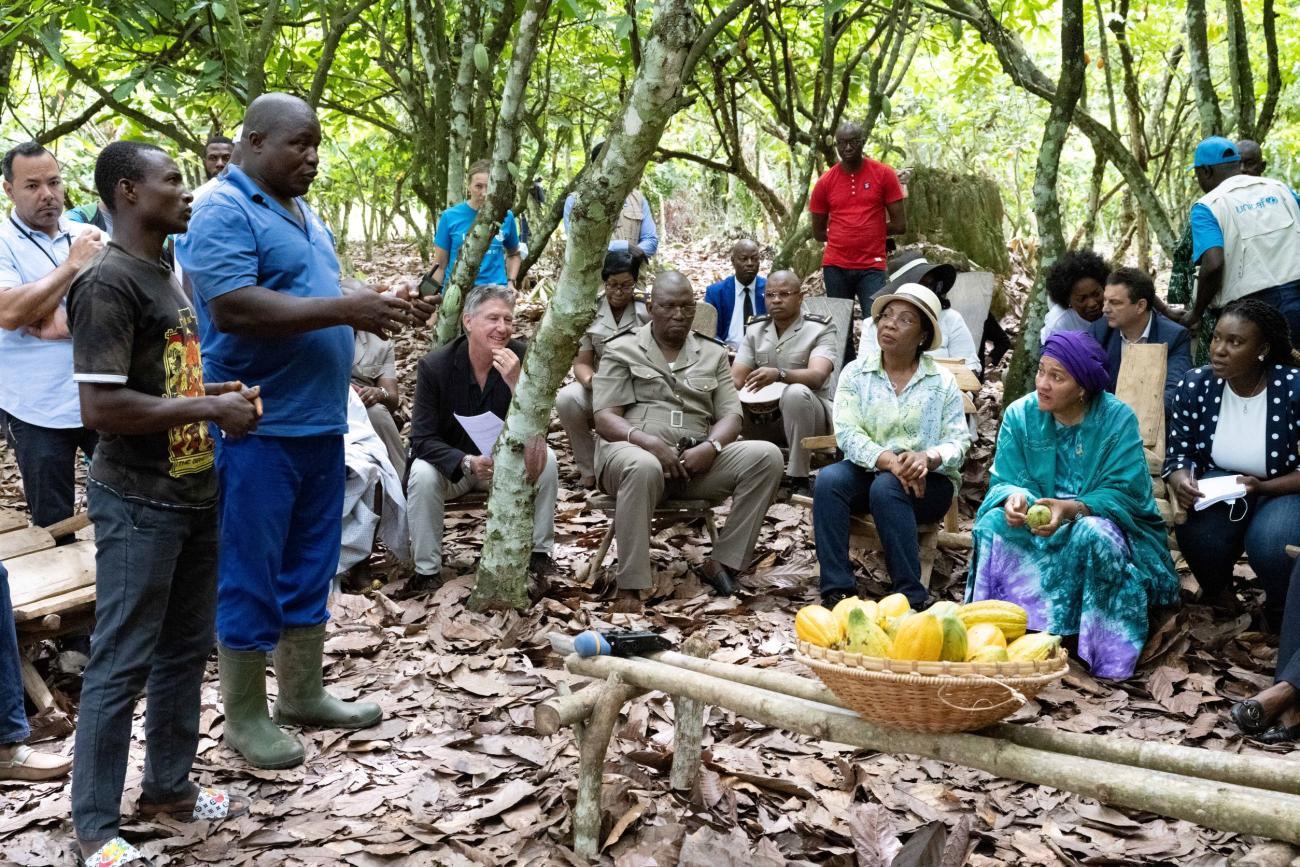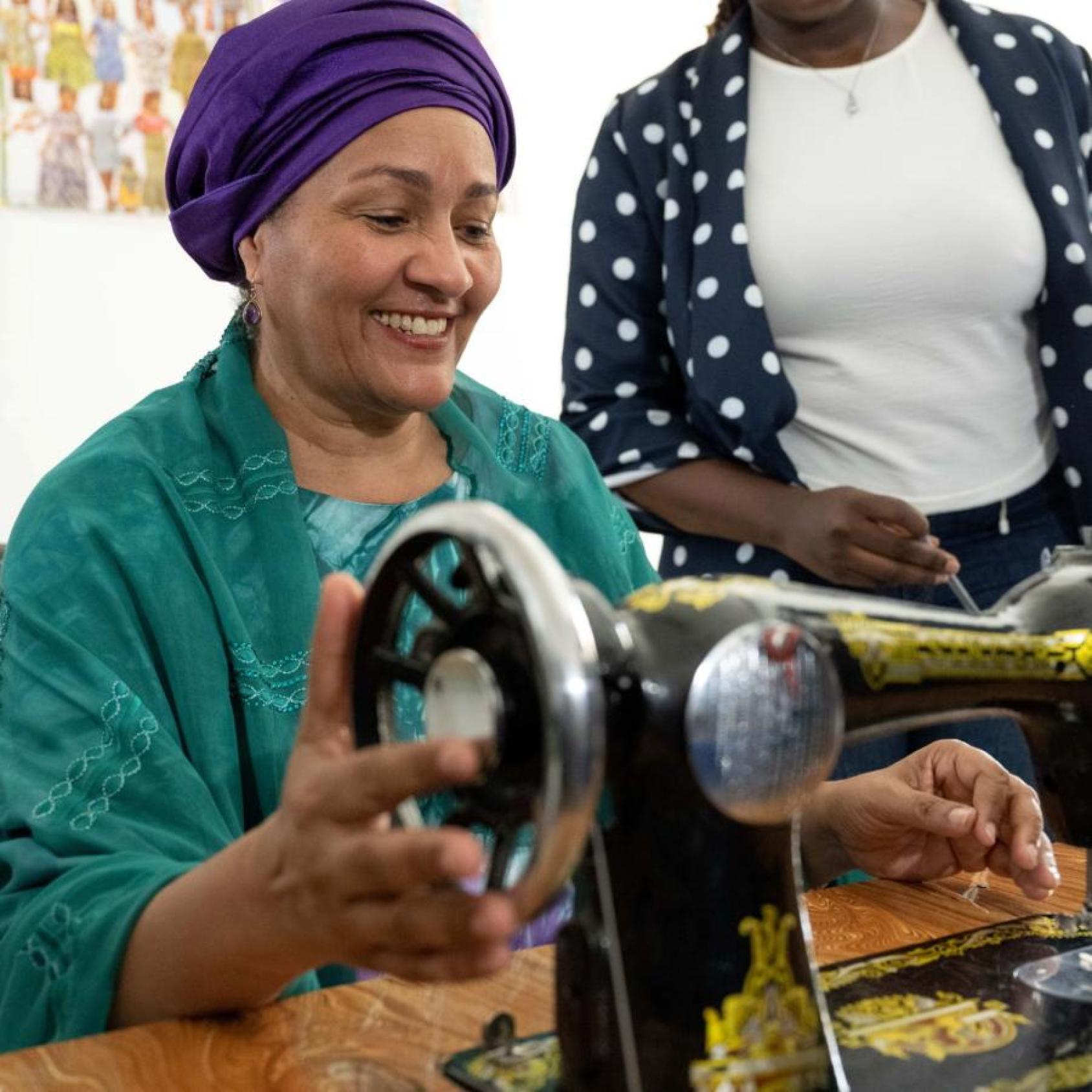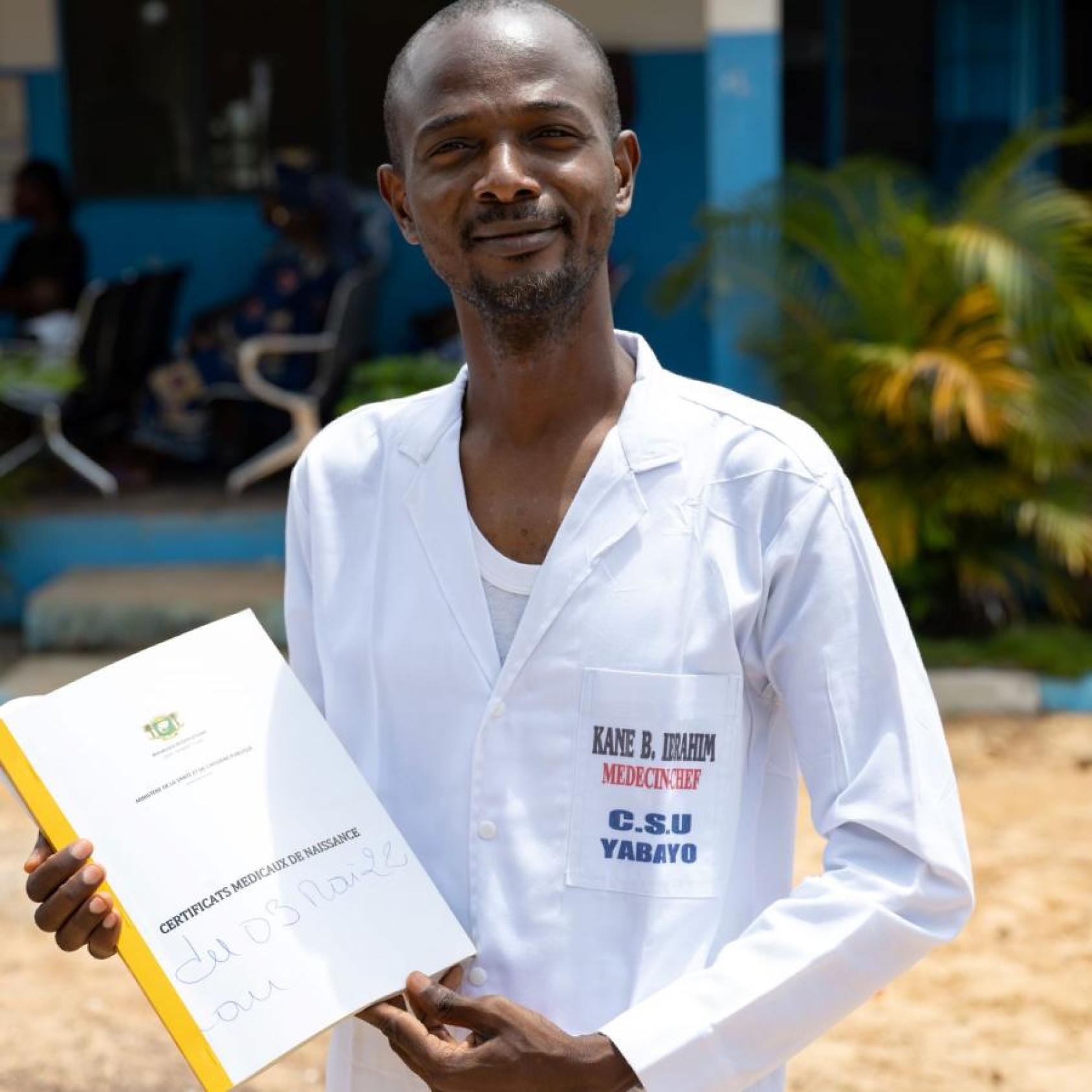Sustainable cocoa farming in Côte d'Ivoire: UN deputy chief notes significant progress and calls for greater international support

The UN Deputy Secretary-General visited Soubré, a major cocoa-producing region of Côte d'Ivoire, to assess UN’s support to the Government of Côte d'Ivoire in the area of sustainable cocoa production. She noted significant improvements in the sector’s sustainability and called for increased international solidarity to support the efforts made by the Ivorian authorities, the UN and its partners.
On May 8, 2022, ahead of the Conference of the Parties (COP15) of the United Nations Convention to Combat Desertification (UNCCD), UN Deputy Secretary-General Amina Mohammed visited Soubré, the capital of the Nawa region in the southwest of Côte d'Ivoire: one of the country’s most important cocoa-producing regions.
"The aim of this visit is to get a better understanding of the complexity and challenges of sustainable cocoa farming in the Nawa region and in Côte d'Ivoire, and to highlight our approach in support of the government's efforts," explained M. Philippe Poinsot, the United Nations Resident Coordinator in Côte d'Ivoire.
Improving agricultural productivity, empowering women and protecting children from economic exploitation
The first stop of the visit was to the village of Kouakoukro, located on the outskirts Soubré. Here UNICEF is supporting the National Agency for Rural Development (Agence Nationale de Développement Rural) establish Farming Training Projects (Champs-Écoles): an initiative set up to teach cocoa producers farming techniques to increase their productivity and income and in doing so help eliminate child labor.
"The initiative [for the establishment] of the Champs-Écoles not only has a positive impact on our income, but it also helps us solve the issue of child labor since we work in solidarity in our fields and increased incomes allow us to hire more workers," explained the Chief of the village of Kouakoukro, who is himself a cocoa producer.
Addressing the farmers, Ms. Mohammed welcomed the Champ-École initiative:
"Our discussion in this camp helped me better understand the efforts made through different partnerships to improve cocoa production in the interest of the children, so that they no longer have to work on the plantations, but also in the interest of the families, who see their income increase. Helping stakeholders from the production stage is a great initiative," she said.
Ms. Mohammed was also pleased to see the support provided to women cocoa producers:
"Women [cocoa] farmers, some of whom are small-scale women farmers, need to be supported to be able to leverage the Champs- Écoles initiative to increase their income and improve their quality of life and that of their families."
A center to support and rehabilitate children who were previously forced to work
After Kouakoukro, the UN delegation visited the Soubré Children in Need Center (Centre d’accueil des enfants en détresse) which was set up in 2018 to help improve the care and reintegration of children previously working in the cocoa fields of the Nawa region. The center was opened by the First Lady of the Côte d'Ivoire Ms. Dominique Ouattara.
The deputy UN chief was struck by this level of support and collaboration.
"I was impressed by the investments made with support from the First Lady, the Government and the UN to enable children working on cocoa plantations to reintegrate into the education system, provide them with access to health care and education, and give them an opportunity to dream of a better future. This center is equipped with a comprehensive set of quality infrastructure that meets a wide range of education needs," said Ms. Mohammed following her visit to the center.

Non-registration of births contributes to perpetuating child labor
At the Health Center in Yabayo, a community located 20 km from Soubré, the deputy UN chief was briefed on the newly established birth registration system. She was accompanied for this visit by Ms. Niale Kaba, Minister of Planning and Development, Ms. Nassénéba Touré, Minister of Women, Family and Children, and Mr. Adama Kamara, Minister of Employment and Social Protection.
The birth registration rate in the cocoa producing regions of Côte d'Ivoire is lower than the national average. When births are not registered, children are left without a birth certificate and cannot take the end-of-school exam, which excludes them from the school system and reduces their chances of realizing their potential in life compared to other children. The low rate of birth certification in these regions adds to the vulnerability of children, who already face multiple threats, including child labor.
UNICEF supported the Ministries of Justice, Health and Internal Affairs establish this new birth registration system, which now registers births directly at the maternity ward of the Yabayo Health Center.
"Since the system was implemented, the birth registration rate has improved significantly, from 150 births registered previously to more than 600 births registered on average every year," explained the Chief Medical Officer of the Yabayo Health Center, who also stressed the need to raise awareness among rural communities and encourage them to continue to register their children’s births.

Promoting social protection to reduce the incidence of child labour
In Grand-Zattry, 40 km from Soubré, ILO is implementing the ACCEL Project (Accelerating Action for the Elimination of Child Labour Project). Through the Work Improvement in Neighborhood Development ‘WIND’ approach this project provides cocoa farmers with access to social protection, helping to reduce household vulnerability to the impact of work-related accidents and diseases and lower the rate of child labor.
Whilst visiting the community, Ms. Mohammed met with local cooperatives and community members, both beneficiaries of the Village Savings and Loan Association (Association Villageoise d’Épargne et de Crédits) and the WIND approach.
Ms. Mohammed gained valuable insight from this visit.
"The discussions I had with you helped me understand how production can be improved through new methods and new best farming practices.”
Reforestation is imperative to combat the devastating effects of deforestation
With an 80% reduction in forest coverage since 1960, Côte d'Ivoire now has one of the highest deforestation rates in the world. According to the National Bureau of Technical Studies and Development (Bureau National d’Études Techniques et Développement), cocoa cultivation, through the extension of farming on forest land, is one of the main direct contributors to the depletion of forest resources.
In Soubré, as in several other cocoa-producing areas, the Conseil du Café-Cacao- the governmental agency tasked with regulating the activities of the coffee-cocoa sector - has initiated a forest cover restoration project to help maintain conditions necessary for sustainable coffee and cocoa production.
The Deputy Secretary-General visited a cocoa plantation where farmers use agroforestry techniques. She commended the authorities for the initiative because, as she said:
"It is crucial for a country like Côte d'Ivoire, which has lost nearly 80 percent of its forest cover, to engage in forestry. Agroforestry allows farmers to diversify their production, reforest farmlands, thus fighting against global warming and improving their livelihoods. Plantation regeneration is key to the sustainability of the cocoa sector."
Concluding her visit, Ms. Mohammed expressed her appreciation for the development of joint initiatives between the Ivorian Government and other partners committed to promoting sustainable cocoa production in Côte d'Ivoire.
"My visit to Soubré was very inspiring. It allowed me to assess both the strategic and operational support that the UN provides to the government in collaboration with other technical and financial partners, whether bilateral or multilateral," she said, before calling for greater international support to Côte d'Ivoire and other cocoa-producing countries.
"With the Ivoirian authorities and their partners working towards sustainable cocoa production, the pressure is now on the international community. We must apply here the solutions advocated at the international level. More investments are needed to combat climate change, achieve the energy transition, transform agriculture and promote the digital economy. We are committed to making our case for Côte d'Ivoire loud and clear."
Côte d'Ivoire is the world's largest cacao producer with 40% of the world’s cacao production by volume. Cacao accounts for up to 20% of the country's total Gross Domestic Product (GDP), 40% of its export earnings and more than 10% of its public revenue. More than six million people work in the cacao sector and 70-80% of farmers' incomes depend on it. Achieving sustainability in cacao production is critical for the country's long-term socio-economic development.
The original version of this article was written in French by Benoît Gohoun, Communications and Advocacy Officer at the UN Resident Coordinator Office in Côte d'Ivoire. The piece was edited and translated to English by the UN Development Coordination Office (DCO). For more information on the UN's work in Côte d'Ivoire, please visit Cotedivoire.UN.org.













